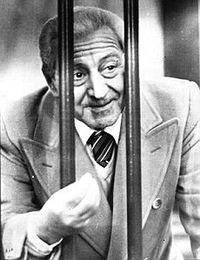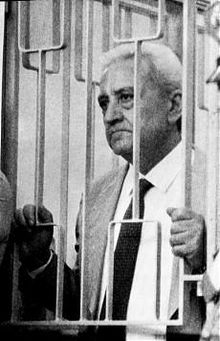- Michele Greco
-
Michele "The Pope" Greco 
Born May 12, 1924
Ciaculli, SicilyDied February 13, 2008 (aged 83)
Rome, ItalyCharge(s) 78 counts of Murder Penalty Life imprisonment Occupation Mafioso, Landowner Michele Greco (Ciaculli, May 12, 1924 – Rome, February 13, 2008) was a member of the Sicilian Mafia, previously incarcerated for multiple murders. His nickname was "il Papa" (The Pope) because of his ability to mediate between different Mafia families.[1] Greco was the head of the Sicilian Mafia Commission.
Contents
Rise to power
Michele Greco was part of the powerful Greco Mafia clan that ruled both in his native Ciaculli and in Croceverde Giardini, two suburbs close to Palermo. He took over the mandamento of Croceverde Giardini after his father Giuseppe Greco, "Piddu u tinenti", died. He was a cousin of Salvatore "Ciaschiteddu" Greco, the first "secretary" of the first Sicilian Mafia Commission that was formed somewhere in 1958. He and his brother Salvatore Greco operated low profile and were able to enter into relationships with businessmen, politicians, magistrates and law enforcement officials through their membership of Masonic lodges.[2]
Salvatore Greco’s nickname was "The Senator" for his political connections.[3] He was the kingmaker of Christian Democrat politicians such as Giovanni Gioia, Vito Ciancimino and Giuseppe Insalaco.[4] Many of those notables were invited by "The Pope" and "The Senator" to wine and dine and take part in hunting parties at his estate La Favarella. The estate was also used as a refuge for mafiosi on the run, and to set up a heroin laboratory.[5][6]
Greco, along with other Mafia families around Palermo, controlled a large portion of the water supply. He was financing the digging of his wells with government money. According to the law, landowners were only allowed to have wells for their own private use and all excess water belonged to the public. However, the city of Palermo issued regular contracts to buy water from Greco and other Mafia bosses for a full third of the water supply. During the summer, when water was particularly scarce and badly needed for irrigation, Greco sold water at exorbitant prices. The perpetual shortage of water was maintained by the Mafia and their friends in city hall.[7][8]
Another money making scheme was collecting subsidies from the European Community (EC) for destroying citrus crops he had never grown. The EC, in order to limit production, paid farmers to destroy part of their production. Greco paid EC inspectors to falsify the records.[8]
Puppet boss
Michele Greco was nominated the head of the Sicilian Mafia Commission (Cupola) in 1978, after Gaetano Badalamenti was expelled. Greco gave the Commission a façade of neutrality behind which the Corleonesi effectively hid their expansion.[9] In 1981, Mafia bosses Stefano Bontade and Salvatore Inzerillo were murdered within a few weeks of each other in the midst of the Second Mafia War. Through his position within the Cupola, Michele Greco assumed indirect control of Stefano Bontade's Mafia family after his murder. Not long after Greco invited a number of Bontade's allies for a meeting at his country estate. A couple members of the clan were suspicious and did not go, but at least eleven mafiosi went along and were wiped out, never to be seen again.
As it turned out, Michele Greco had been allied with Salvatore Riina and the Corleonesi all along. Riina had used Greco's position on the Commission to help banish Gaetano Badalamenti from the Mafia and then, after Riina ordered Bontade's murder, he had Greco oversee Bontade's Mafia clan who was in control of a heroin distribution network in the United States, along with the Inzerillo Mafia clan.
One of the men who did not turn up to the fateful meeting at Greco's estate was Salvatore Contorno. He sensed trouble and soon went into hiding when the Mafia War broke out. He narrowly escaped death during an ambush by a Corleonesi hitman, Michele's nephew Pino Greco. While in hiding from both the authorities and the Corleonesi, Contorno sent anonymous letters to the police, revealing to the authorities information on the Mafia, its members, the various factions and the violent turmoil it was undergoing. Contorno was eventually arrested in 1983 and became a fully fledged informant the following year, following Tommaso Buscetta's example.
Contorno's revelations in his letters to the police were the first time the authorities had really learned of Michele Greco's high-ranking membership of the Mafia. Previously he had just been regarded as a rather secretive landowner with a suspiciously high-income, although he did come from a long line of mafiosi.
Greco was a powerful mafia boss, descended from a long line of mafiosi, but in the latter part of his criminal career he could be best described as little more than Riina's "puppet boss". According to pentito Tommaso Buscetta, Michele Greco, "given his bland and weak personality, was the perfect person to become head of the Commission so as not to stand in the way of Riina designs."[10] Buscetta explained that during meetings between the heads of various Mafia families, Michele Greco would just nod his head and agree with virtually everything Riina said.
Manhunt and capture
 Mafia boss Michele Greco during the Maxi Trial.
Mafia boss Michele Greco during the Maxi Trial.
Based on Salvatore Contorno's anonymous revelations, police chief Antonino 'Ninni' Cassarà drew up a report in July 1982 listing 162 Mafiosi who warranted arrest, and the report was unofficially known as the 'Michele Greco + 161' report, signalling Greco's importance over the other suspects.[11] On August 6, 1985, Ninni Cassarà and one of his bodyguards, Giovanni Lercara, were massacred by a team of up to fifteen gunmen outside Cassarà's home in front of his horrified wife.
The 'Michele Greco + 161' report was just the start of an investigation that was to become the Maxi Trial, where most of the leadership of the Mafia were tried for numberless crimes. On July 9, 1983, Greco was indicted by judge Giovanni Falcone, along with 14 others among which his brother Salvatore Greco, Totò Riina, Bernardo Provenzano and Nitto Santapaola for the murder on the prefect of Palermo, General Carlo Alberto Dalla Chiesa on September 3, 1982.[3]
After four-years on the run, Michele Greco was arrested on February 20, 1986, and he joined the hundreds of defendants at the Maxi Trial, which had started just ten-days previously.[12] Greco was charged with ordering seventy-eight murders,[13] including those of the anti-Mafia magistrate Rocco Chinnici, Chinnici's two bodyguards and an innocent bystander, the four of whom had been killed by a car bomb in 1983.
Greco gave testimony at the trial where, like his co-defendants, he insisted he was completely innocent and knew nothing about any Mafia. To illustrate his standing as a supposedly honest citizen, he boasted of all the illustrious people he had entertained at his large estate, including a former chief prosecutor and police chiefs. He also admitted that Stefano Bontade had often hunted on his estate, and in something of an alarmingly off-hand statement, Greco said that he and Stefano "were together on the Holy Friday, just days before his misfortune."[5] The "misfortune" he referred to was Stefano being machine-gunned in the face.
At the end of the trial, on December 16, 1987, Michele Greco, then aged 63, was found guilty on all charges and sentenced to life imprisonment.[13]
Imprisonment and death
The Maxi Trial was largely undone by notoriously generous appeals, mostly thanks to Corrado Carnevale, who would release Mafiosi on the slightest of pretexts, much to the frustration of the Maxi Trial's architects, Giovanni Falcone and Paolo Borsellino. Greco was released on appeal on February 27, 1991,[14] but Giovanni Falcone, who had become head of the Penal Affairs section of the Italian ministry of Justice, issued a decree that ordered the re-incarceration of Greco and other mafiosi.[15]
In the light of this, Michele Greco was quickly rearrested in February 1992 and put back behind bars to serve his freshly reinstated life-sentence. Greco never admitted his crimes nor his position in Cosa Nostra. In a letter sent to the press in the summer of 2007, he claimed he was "as innocent as a newborn child." He added that "because of an injustice in the 1980s I have been buried alive and have been in prison for 22 years. The dampness of my cell has destroyed my health and I am truly in a bad way."[16] He remained in prison in Rome until his death on February 13, 2008.[17][18][19]
According to historian John Dickie, Greco "was the very archetype of a mafia capo: unsmiling, taciturn, given to speaking only in maxims and allusive parables."[6]
References
- ^ (Italian) Ascesa, omicidi e sconfitte tutti i segreti del "Papa", La Repubblica, February 13, 2008
- ^ Schneider & Schneider, Reversible Destiny, p. 77-78
- ^ a b Stille, Excellent Cadavers, p. 80
- ^ Caruso, Da cosa nasce cosa, p. 487
- ^ a b Stille, Excellent Cadavers, pp. 187-88
- ^ a b Dickie, Cosa Nostra, p. 209
- ^ Umberto Santino, L'acqua rubata. Dalla mafia alle multinazionali, Centro Siciliano di Documentazione "Giuseppe Impastato"
- ^ a b Stille, Excellent Cadavers, p. 62
- ^ Stille, Excellent Cadavers, p. 108
- ^ Stille, Excellent Cadavers, p. 108/201
- ^ Schneider & Schneider, Reversible Destiny, pp. 137-38
- ^ Italy: Putting the Finger on Il Papa, Time Magazine, March 3, 1986
- ^ a b 338 Guilty in Sicily in a Mafia Trial; 19 Get Life Terms, The New York Times, December 17, 1987
- ^ Sicilian Mafia Leader Freed on Technicality, Reuters, February 27, 1991.
- ^ For Sicilians Fighting the Mafiosi, Life Is a Trial, The New York Times, March 27, 1991
- ^ Mafia boss Michele Greco dead at 83, ANSA, February 13, 2007
- ^ Italy: Mafia 'Pope' dies in Rome clinic, Adnkronos International, February 13, 2008
- ^ Imprisoned ex-top Mafia boss Michele Greco is dead at 84, International Herald Tribune, February 13, 2008
- ^ (Italian) Mafia, morto il boss Michele Greco, La Repubblica, February 13, 2008
Sources
- (Italian) Caruso, Alfio (2000). Da cosa nasce cosa. Storia della mafia dal 1943 a oggi, Milan: Longanesi ISBN 88-304-1620-7
- Dickie, John (2004). Cosa Nostra. A history of the Sicilian Mafia, London: Coronet, ISBN 0-340-82435-2
- Schneider, Jane T. & Peter T. Schneider (2003). Reversible Destiny: Mafia, Antimafia, and the Struggle for Palermo, Berkeley: University of California Press ISBN 0-520-23609-2
- Stille, Alexander (1995). Excellent Cadavers: The Mafia and the Death of the First Italian Republic, New York: Vintage ISBN 0-09-959491-9
External links
- (Italian) Biographies of Mafia bosses
- Best Of Sicily's Mafia page
- Video of Michele Greco giving a statement at the Maxi Trial, from youtube.com
- (Italian) Michele Greco detto 'Il Papa', Teleacras on youtube.com
Sicilian Mafia Chain of Command Sicilian Mafia Commission (Cupola) · Family (Cosca) · Boss (Capofamiglia) · Underboss (Sotto capo) · Consigliere (Advisor) · Capodecina (Caporegime) · Soldato (Soldier) · AssociateCodes and Terms Sicilian Mafia clans Corleonesi · Cuntrera-Caruana Mafia clan · Greco Mafia family · Motisi Mafia clan · Inzerillo-Gambino Mafia clanMembers (Category) Meetings Palermo Mafia summit (1957)Wars Massacres Portella della Ginestra massacre (1947) · Ciaculli massacre (1963) · Viale Lazio massacre (1969) · Train 904 bombing (1984) · Pizzolungo bombing (1985)Antimafia (Category) Italian Antimafia Commission (members) · Addiopizzo · Pentito · List of victims of the Sicilian MafiaTrials Categories:- 1924 births
- 2008 deaths
- People from Palermo (city)
- Sicilian Mafiosi
- Sicilian Mafia Commission
- Sicilian Mafiosi who died in prison custody
- Italian drug traffickers
- Italian people who died in prison custody
- Prisoners who died in Italian detention
- Italian prisoners sentenced to life imprisonment
- Prisoners sentenced to life imprisonment by Italy
- Cancer deaths in Italy
- Deaths from lung cancer
Wikimedia Foundation. 2010.
